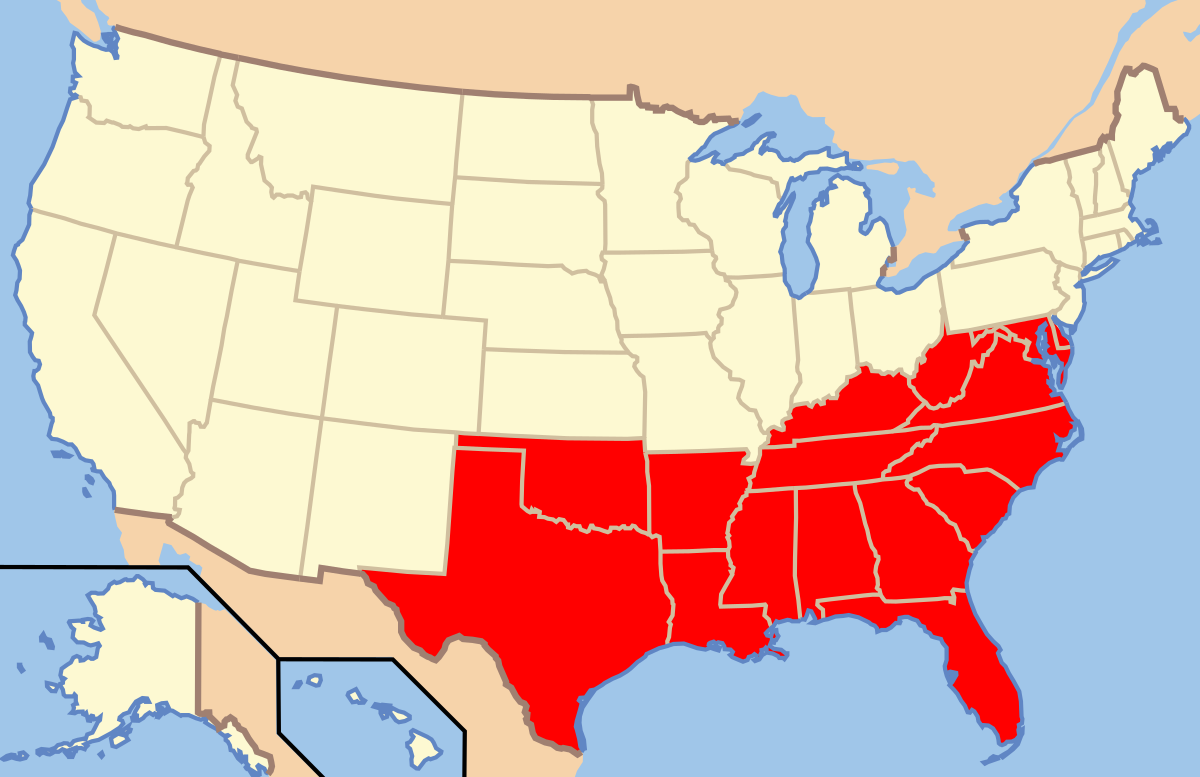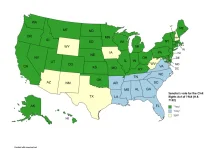Then why did you say, "Democrats, the party of slaves and the KKK"?Same conclusion, the KKK wasn’t started by the Democrat political party. However, the ones who formed the KKK were still Democrats. Still doesn’t change the truth, but only tries to distort it.
Conclusion
Verdict: False
The assertion that the Democratic Party founded the Ku Klux Klan is false.
-
This is a political forum that is non-biased/non-partisan and treats every person's position on topics equally. This debate forum is not aligned to any political party. In today's politics, many ideas are split between and even within all the political parties. Often we find ourselves agreeing on one platform but some topics break our mold. We are here to discuss them in a civil political debate. If this is your first visit to our political forums, be sure to check out the RULES. Registering for debate politics is necessary before posting. Register today to participate - it's free!
Conservatives tried to hijack Juneteenth Day by claiming Republicans freed the slaves
- Thread starter GhostFence
- Start date
- Joined
- Nov 12, 2012
- Messages
- 104,278
- Reaction score
- 26,203
- Location
- Houston, in the great state of Texas
- Gender
- Male
- Political Leaning
- Slightly Conservative
So the least amount of money you can earn legally is $0.00 rightNo one ever said a minimum wage is a right to income. You're conflating minimum wage, with a right to earn income.
So if you're not entitled to a job you aren't entitled to income right? So the minimum is $0.00They're not the same.
- Joined
- Oct 31, 2020
- Messages
- 15,147
- Reaction score
- 5,744
- Gender
- Male
- Political Leaning
- Conservative
Then why did you say, "Democrats, the party of slaves and the KKK"?
Because we still had a kkk member, Robert Byrd, run and win on the Democrat ticket. You know, Hillary Clinton’s mentor.
Again, you're conflating minimum wage with the right to earn income. Again, they are not the same. There is no such thing as a right to earn income. Whereas there is such a thing as minimum wage. Which means aside from a couple of exceptions, if you do have an income earning job, your employer is legally required to pay you a minimum wage.So the least amount of money you can earn legally is $0.00 right
So if you're not entitled to a job you aren't entitled to income right? So the minimum is $0.00
- Joined
- Nov 12, 2012
- Messages
- 104,278
- Reaction score
- 26,203
- Location
- Houston, in the great state of Texas
- Gender
- Male
- Political Leaning
- Slightly Conservative
No you aren't getting it. If you require McDonald's employees to be paid $20.00 an hour it increases the price of food to the point most people spending that much will go to a better restaurant. Meaning most employees are let go of and the new minimum is $0.00Again, you're conflating minimum wage with the right to earn income.
So minimum wage is $0.00Again, they are not the same. There is no such thing as a right to earn income.
Yes $0.00Whereas there is such a thing as minimum wage.
Unless it's goes belly up or automates. Then you get nothing.Which means aside from a couple of exceptions, if you do have an income earning job, your employer is legally required to pay you a minimum wage.
- Joined
- Nov 18, 2016
- Messages
- 60,433
- Reaction score
- 37,535
- Gender
- Male
- Political Leaning
- Liberal
Because we still had a kkk member, Robert Byrd, run and win on the Democrat ticket. You know, Hillary Clinton’s mentor.
So what was the role of Nixon‘s southern strategy?
"From now on, the Republicans are never going to get more than 10 to 20 percent of the Negro vote and they don't need any more than that... but Republicans would be shortsighted if they weakened enforcement of the Voting Rights Act. The more Negroes who register as Democrats in the South, the sooner the Negrophobe whites will quit the Democrats and become Republicans. That's where the votes are. Without that prodding from the blacks, the whites will backslide into their old comfortable arrangement with the local Democrats."
-Kevin Phillips, chief campaign advisor to Richard Nixon and senior GOP political strategist, 1970
Of course, the strategy was continued with future Republican administrations, as shown in this interview with Lee Atwater, chief campaign advisor to Ronald Reagan and senior GOP political strategist, in this interview from 1981:
Atwater: As to the whole Southern strategy that Harry Dent and others put together in 1968, opposition to the Voting Rights Act would have been a central part of keeping the South. Now [Reagan] doesn't have to do that. All you have to do to keep the South is for Reagan to run in place on the issues he's campaigned on since 1964 [...] and that's fiscal conservatism, balancing the budget, cut taxes, you know, the whole cluster...
Questioner: But the fact is, isn't it, that Reagan does get to the Wallace voter and to the racist side of the Wallace voter by doing away with legal services, by cutting down on food stamps?
Atwater: Y'all don't quote me on this. You start out in 1954 by saying, "Nigger, nigger, nigger." By 1968 you can't say "nigger"—that hurts you. Backfires. So you say stuff like forced busing, states' rights and all that stuff. You're getting so abstract now [that] you're talking about cutting taxes, and all these things you're talking about are totally economic things and a byproduct of them is [that] blacks get hurt worse than whites. And subconsciously maybe that is part of it. I'm not saying that. But I'm saying that if it is getting that abstract, and that coded, that we are doing away with the racial problem one way or the other. You follow me—because obviously sitting around saying, "We want to cut this," is much more abstract than even the busing thing, and a hell of a lot more abstract than "Nigger, nigger."

Southern strategy - Wikipedia
- Joined
- Dec 12, 2016
- Messages
- 42,769
- Reaction score
- 19,505
- Gender
- Male
- Political Leaning
- Liberal
Ok, let us know when discrimination has ended.So once that is stopped they should be fine. Going further to give them training wheels doesn't help
Yes it is. If otherwise qualified men, women, gays, straights, Blacks, Whites, Latinos, Anglo’s, Asians, Jews, Muslims, Catholic etc. cannot be discriminated against because of their being so, that creates equal opportunity in the common definition of the term. If you wish to live in a world of your own special meanings of words and phrases, you are free to do so.Yep.
It's not an equal opportunity though.
So you are playing word games now? The minimum wage in common parlance is what per hour rate an employer is required to pay someone he hires, depending on the laws in the jurisdiction in question. So I am being paid nothing to comment here on DP, but if someone were to hire me to do so, s/he would have to pay me a certain amount.No in all places on the planet the minimum wage is 0. Do you have the right to income?
Again, you're conflating minimum wage with a right to earn income. They are not the same things.No you aren't getting it. If you require McDonald's employees to be paid $20.00 an hour it increases the price of food to the point most people spending that much will go to a better restaurant. Meaning most employees are let go of and the new minimum is $0.00
So minimum wage is $0.00
Yes $0.00
Unless it's goes belly up or automates. Then you get nothing.
- Joined
- Oct 31, 2020
- Messages
- 15,147
- Reaction score
- 5,744
- Gender
- Male
- Political Leaning
- Conservative
It was founded by conservatives who, at the time, were democrats. Now vonservatives are Republicans.
View attachment 67576145
The party switch is a lie in attempt to blame Republicans for the Democrats own racist past. That’s why when Robert Byrd, a kkk member ran for Congress, he went as a Democrat, not as a Republican.
But as always, the truth is always malleable to Democrats. Up is down, right is left.
Well that's not true. There's no evidence to show Byrd was a member of the KKK when he was elected to Congress.The party switch is a lie in attempt to blame Republicans for the Democrats own racist past. That’s why when Robert Byrd, a kkk member ran for Congress, he went as a Democrat, not as a Republican.
But as always, the truth is always malleable to Democrats. Up is down, right is left.
But are you claiming the south was mostly Liberal? When did it turn mostly conservative?
- Joined
- Jan 25, 2008
- Messages
- 44,837
- Reaction score
- 35,216
- Location
- Southern England
- Gender
- Male
- Political Leaning
- Slightly Liberal
Bizarre projection here.The party switch is a lie in attempt to blame Republicans for the Democrats own racist past. That’s why when Robert Byrd, a kkk member ran for Congress, he went as a Democrat, not as a Republican.
But as always, the truth is always malleable to Democrats. Up is down, right is left.
- Joined
- Nov 12, 2012
- Messages
- 104,278
- Reaction score
- 26,203
- Location
- Houston, in the great state of Texas
- Gender
- Male
- Political Leaning
- Slightly Conservative
What's the least amount of money an hour that you can earn? I suggest it's zero because there are people who don't have jobs so that's the minimum wage.Again, you're conflating minimum wage with a right to earn income. They are not the same things.
I'm not conflating you are.
- Joined
- Mar 14, 2021
- Messages
- 41,096
- Reaction score
- 29,671
- Gender
- Male
- Political Leaning
- Liberal
No.The party switch is a lie in attempt to blame Republicans for the Democrats own racist past. That’s why when Robert Byrd, a kkk member ran for Congress, he went as a Democrat, not as a Republican.
But as always, the truth is always malleable to Democrats. Up is down, right is left.
Lincoln was a liberal. Southern democrats were conservative.
Thst is a fact not a lie.
Southern democrats were conservative all the way up until the 60".
After the civil rights movement southern conservative gradually started voting republican.
The south is still conservative like it always has been. Now it is solidly Republican.
Those are facts.
- Joined
- Sep 6, 2022
- Messages
- 25,162
- Reaction score
- 22,378
- Location
- Colorado
- Gender
- Male
- Political Leaning
- Liberal
Same conclusion, the KKK wasn’t started by the Democrat political party. However, the ones who formed the KKK were still Democrats. Still doesn’t change the truth, but only tries to distort it.
Conclusion
Verdict: False
The assertion that the Democratic Party founded the Ku Klux Klan is false.
Nope.
You have been proven wrong.
Stop telling lies.
- Joined
- Sep 6, 2022
- Messages
- 25,162
- Reaction score
- 22,378
- Location
- Colorado
- Gender
- Male
- Political Leaning
- Liberal
He apologized for what he did. He was NOT KKK when he died.Because we still had a kkk member, Robert Byrd, run and win on the Democrat ticket. You know, Hillary Clinton’s mentor.
If you have a paying job, minimum wage.What's the least amount of money an hour that you can earn? I suggest it's zero because there are people who don't have jobs so that's the minimum wage.
I'm not conflating you are.
- Joined
- Dec 22, 2012
- Messages
- 79,554
- Reaction score
- 27,073
- Location
- Portlandia
- Gender
- Male
- Political Leaning
- Libertarian - Right
LOL.He apologized for what he did. He was NOT KKK when he died.
People lie all the time. Hatred like that isn't something that just washes away.
You believe what ever narrative the left tells you to believe.
- Joined
- May 13, 2009
- Messages
- 20,725
- Reaction score
- 15,144
- Gender
- Male
- Political Leaning
- Other
Republicans did free the slaves. However, with the "southern strategy" they became the party of segregation and Jim Crow. The Republican party of Lincoln is not the Republican party of today.
- Joined
- Dec 22, 2012
- Messages
- 79,554
- Reaction score
- 27,073
- Location
- Portlandia
- Gender
- Male
- Political Leaning
- Libertarian - Right
Yet even into 1965, the republicans voted for the Civil Rights Act at something like 80%, and the democrats were far less of a percentage.Republicans did free the slaves. However, with the "southern strategy" they became the party of segregation and Jim Crow. The Republican party of Lincoln is not the Republican party of today.
- Joined
- May 13, 2009
- Messages
- 20,725
- Reaction score
- 15,144
- Gender
- Male
- Political Leaning
- Other
Yet even into 1965, the republicans voted for the Civil Rights Act at something like 80%, and the democrats were far less of a percentage.
At least in the Senate, there was a very stark north vs south divide when it came to voting on the Civil Rights Act. That doesn't change the fact that the Republican party in their southern strategy tried to appeal to segregationists in the south.

That's because Democrats were still a stronghold in the Conservative south. In the north, a greater percentage of Democrats than Republicans voted for it.Yet even into 1965, the republicans voted for the Civil Rights Act at something like 80%, and the democrats were far less of a percentage.
- Joined
- Dec 22, 2012
- Messages
- 79,554
- Reaction score
- 27,073
- Location
- Portlandia
- Gender
- Male
- Political Leaning
- Libertarian - Right
I have posted the numbers by party before. North and south are generational divided. The numbers do not lie.That's because Democrats were still a stronghold in the Conservative south. In the north, a greater percentage of Democrats than Republicans voted for it.
More republicans as a percentage voted for it than against.
Period.
Ganondagan
DP Veteran
- Joined
- Jan 16, 2024
- Messages
- 6,628
- Reaction score
- 2,574
- Location
- Western New York State
- Gender
- Male
- Political Leaning
- Libertarian - Right
And in the next breath they defend statues of 19th century Confederate Democrat traitors. Today's Democrats are trying to destroy the traitorous legacy of the Confederacy and Republicans are trying to glorify and preserve it and rename US bases in the name of 19th century Democrat Confederate traitors.
Maybe... just maybe... that's because today's Republicans are mainly Southern Democrats who became today's MAGA Republicans? Hence... the reason why MAGAts fly the Confederate flag.
That's not conspiracy, that's living, breathing historical fact.
Republicans, specifically a Republican President, DID free the slaves. Sorry dude, ya can't rewrite history.
You're right, the numbers don't lie.I have posted the numbers by party before. North and south are generational divided. The numbers do not lie.
More republicans as a percentage voted for it than against.
Period.
North:
Democrats (189/198): 95%
Republicans (164/193): 85%
South:
Democrats (9/112): 8%
Republicans (0/12): 0%

